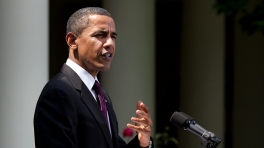The White House
Office of the Press Secretary
Remarks by the President on the DISCLOSE Act
Rose Garden
2:49 P.M. EDT
THE PRESIDENT: Good afternoon, everybody. Tomorrow there’s going to be a very important vote in the Senate about how much influence special interests should have over our democracy. Because of the Supreme Court’s decision earlier this year in the Citizens United case, big corporations –- even foreign-controlled ones –- are now allowed to spend unlimited amounts of money on American elections. They can buy millions of dollars worth of TV ads –- and worst of all, they don’t even have to reveal who’s actually paying for the ads. Instead, a group can hide behind a name like “Citizens for a Better Future,” even if a more accurate name would be “Companies for Weaker Oversight.” These shadow groups are already forming and building war chests of tens of millions of dollars to influence the fall elections.
Now, imagine the power this will give special interests over politicians. Corporate lobbyists will be able to tell members of Congress if they don’t vote the right way, they will face an onslaught of negative ads in their next campaign. And all too often, no one will actually know who’s really behind those ads.
So the House has already passed a bipartisan bill that would change all this before the next election. The DISCLOSE Act would simply require corporate political advertisers to reveal who’s funding their activities. So when special interests take to the airwaves, whoever is running and funding the ad would have to appear in the advertisement and claim responsibility for it -– like a company’s CEO or the organization’s biggest contributor. And foreign-controlled corporations and entities would be restricted from spending money to influence American elections -- just as they were in the past.
Now, you’d think that making these reforms would be a matter of common sense, particularly since they primarily involve just making sure that folks who are financing these ads are disclosed so that the American people can make up their own minds. Nobody is saying you can’t run the ads -- just make sure that people know who in fact is behind financing these ads. And you’d think that reducing corporate and even foreign influence over our elections would not be a partisan issue. But of course, this is Washington in 2010. And the Republican leadership in the Senate is once again using every tactic and every maneuver they can to prevent the DISCLOSE Act from even coming up for an up or down vote. Just like they did with unemployment insurance for Americans who’d lost their jobs in this recession. Just like they’re doing by blocking tax credits and lending assistance for small business owners. On issue after issue, we are trying to move America forward, and they keep on trying to take us back.
At a time of such challenge for America, we can’t afford these political games. Millions of Americans are struggling to get by, and their voices shouldn’t be drowned out by millions of dollars in secret, special interest advertising. The American people’s voices should be heard.
A vote to oppose these reforms is nothing less than a vote to allow corporate and special interest takeovers of our elections. It is damaging to our democracy. It is precisely what led a Republican President named Theodore Roosevelt to tackle this issue a century ago.
Back then, President Roosevelt warned of the dangers of limitless corporate spending in our political system. He actually called it “one of the principal sources of corruption in our political affairs.” And he proposed strict limits on corporate influence in elections not because he was opposed to them expressing their views in the halls of democracy, but he didn’t want everybody else being drowned out.
He said, “Every special interest is entitled to justice, but no one is entitled” -- “not one is entitled to a vote in Congress, or a voice on the bench, or to representation in any public office,” because he understood those weren’t individual voters -- these are amalgams of special interests. They have the right to hire their lobbyists. They have the right to put forward their view. They even have the right to advertise. But the least we should be able to do is know who they are.
So on Tuesday we face the sort of challenge that Teddy Roosevelt talked about over a century ago. We’ve got a similar opportunity to prevent special interests from gaining even more clout in Washington. This should not be a Democratic issue or a Republican issue. This is an issue that goes to whether or not we’re going to have a government that works for ordinary Americans; a government of, by and for the people.
That’s why these reforms are so important, and that’s why I urge the Senate to pass the DISCLOSE Act.
Thank you.
END
2:55 P.M. EDT

